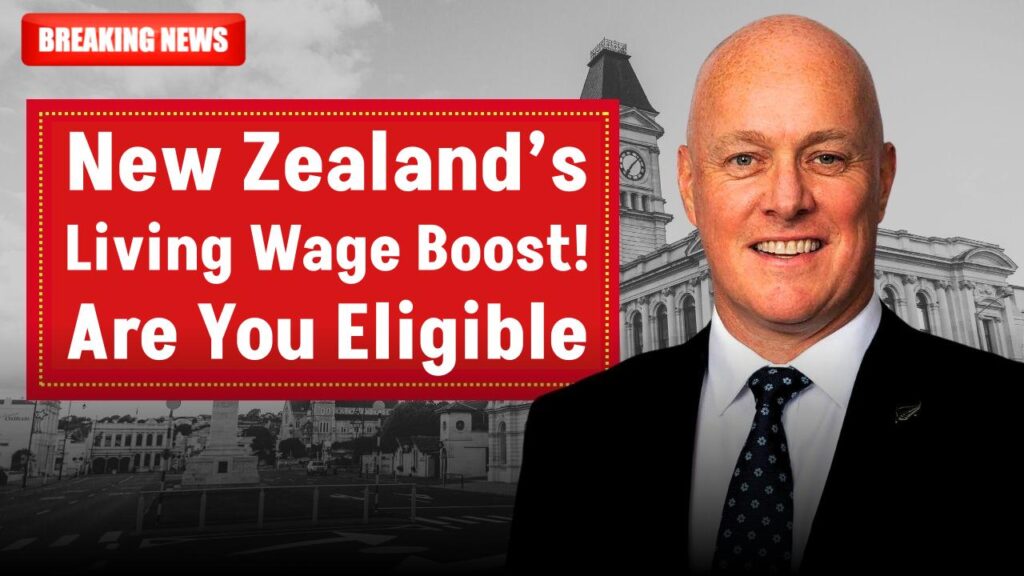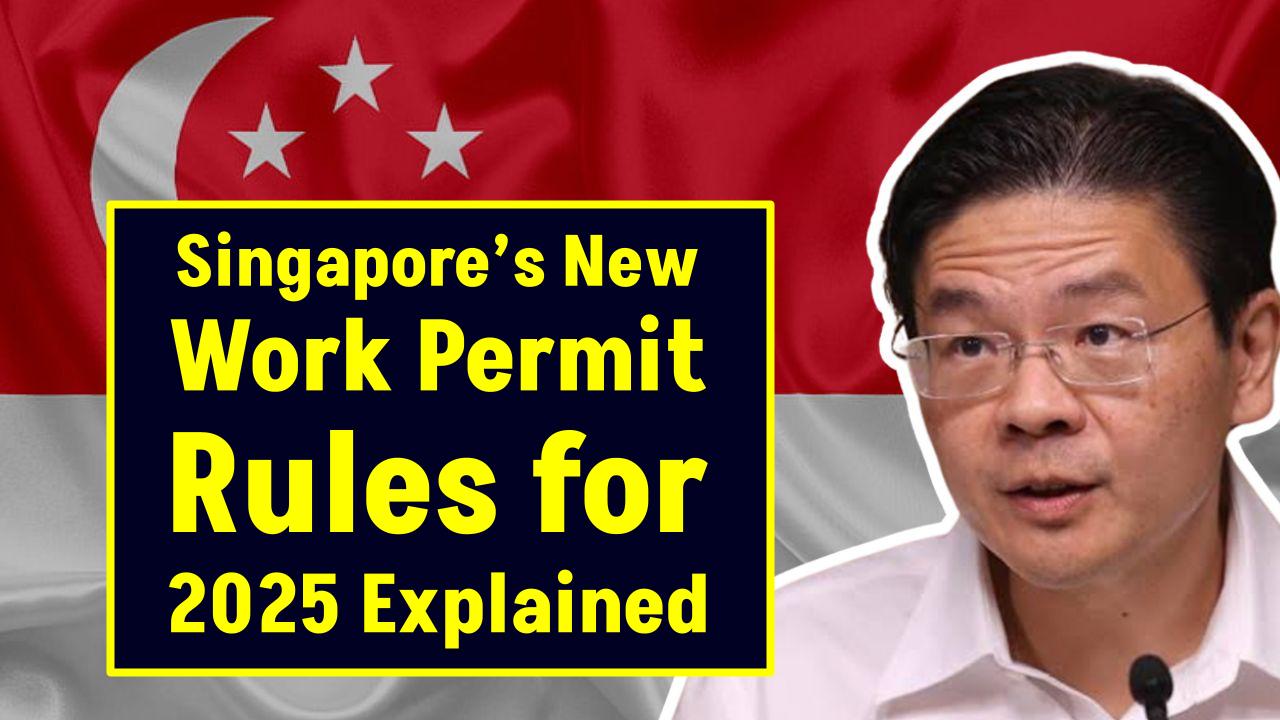Earning Below This Amount? You Might Now Qualify for NZ’s 2025 Living Wage Boost
Living Wage Boost: Starting September 1, 2025, New Zealand’s Living Wage will officially increase to $28.95 per hour, up from the current rate of $27.80. This 4.2% hike aligns with the growth in average ordinary time hourly earnings, reflecting the rising cost of living in the country. The new figure represents a critical boost for thousands of lower-income workers and regular contractors across the country.

The increase follows ongoing advocacy by Living Wage Aotearoa New Zealand, supported by unions, faith-based organizations, and community groups. With inflation, rent, and household bills continually on the rise, this change could make a significant difference—especially for those in sectors that often see pay rates stuck near the national minimum.
Living Wage Boost
| Topic | Details |
|---|---|
| New Living Wage (2025/26) | $28.95 per hour (effective from September 1, 2025) |
| Current Living Wage (2024/25) | $27.80 per hour |
| Minimum Wage (from April 1, 2025) | $23.50 per hour |
| Wage Difference | $5.45 more than the minimum wage |
| Who Qualifies | Employees and regular contractors of accredited Living Wage Employers |
| Main Beneficiaries | Workers in cleaning, catering, security, and retail sectors |
| Official Website | livingwage.org.nz |
The Living Wage increase to $28.95/hour in 2025 is a pivotal moment for New Zealand’s workforce. While it won’t apply to everyone automatically, thousands of workers in accredited companies or essential contractor roles are poised to benefit. It’s more than just a wage bump—it’s a move toward a fairer and more inclusive economy, especially in times of rising living costs.
Make sure to check your eligibility, speak to your employer, and stay updated on public policy changes to fully understand how this development could impact your income and wellbeing.
What Is the New Zealand Living Wage?
The Living Wage is different from the minimum wage. It’s a voluntary pay rate calculated annually to reflect the income needed to cover basic necessities and enable workers to live with dignity and participate in society.
While the legal minimum wage is set by the New Zealand Government, the Living Wage is adopted voluntarily by employers who are accredited by Living Wage Aotearoa. It’s aimed at ensuring workers earn enough to meet the actual cost of living—such as food, rent, transport, and children’s education—without needing to rely on government support.
The new Living Wage of $28.95/hour will be mandatory only for employers who have voluntarily committed to being Living Wage-accredited.
Why the Living Wage Matters in 2025
The increase from $27.80 to $28.95 per hour represents a $1.15 hourly raise, which may seem modest at first glance, but over time adds up:
- For a full-time worker (40 hours/week), this translates to an extra $46/week.
- That’s $2,392 more per year, which could go toward essential expenses like rent or utility bills.
It also sends a powerful message about fair pay during a time when the cost of living in New Zealand remains one of the highest in the OECD.
Who Will Benefit from the Increase?
If you’re currently earning less than $28.95/hour and work for an accredited Living Wage Employer, you will automatically qualify for the raise starting September 1, 2025. This includes:
- Permanent employees
- Part-time staff
- Regular contractors (e.g., cleaners, security guards, caterers) whose services are integral and ongoing
This pay rate increase will especially benefit industries where low-wage work is prevalent, such as:
- Cleaning and janitorial services
- Hospitality and food services
- Security personnel
- Retail and customer service
As per RNZ’s report, this change can be life-altering for many families that rely solely on one income stream.
Living Wage Boost: How to Check If You Qualify?
To determine your eligibility for the Living Wage increase:
Step 1: Check Employer Accreditation
Visit the official Living Wage Aotearoa NZ Employer List to see if your employer is accredited.
Step 2: Confirm Your Employment Type
You qualify if:
- You are employed full-time or part-time by an accredited employer
- You’re a regular contractor (e.g., a cleaner or security guard) regularly servicing the accredited employer’s premises
Step 3: Compare Your Hourly Wage
If your current hourly wage is below $28.95, and you meet the first two conditions, you should see your wage increased on or before September 1, 2025.
Minimum Wage vs Living Wage: What’s the Difference?
| Aspect | Minimum Wage | Living Wage |
|---|---|---|
| 2025 Rate | $23.50/hour | $28.95/hour |
| Set By | New Zealand Government | Living Wage Movement |
| Mandatory? | Yes, for all employers | No, only for accredited employers |
| Covers Contractors? | No | Yes, if working regularly for accredited orgs |
| Updated? | Annually (based on law) | Annually (based on cost of living analysis) |
Ongoing Debate Over Public Sector Contracts
There’s a policy shift under review that could significantly impact public sector workers. The New Zealand Government is considering dropping the requirement for Living Wage compliance in new contracts, especially in areas such as:
- Cleaning
- Security
- Catering
If approved, new government contractors may no longer need to pay their staff the Living Wage, even if previous contracts required it. This has sparked concern among unions and advocacy groups, who warn that it could reverse progress made in income equality.
As highlighted by Scoop.co.nz, there’s fear this rollback would disproportionately affect low-income, Māori, and Pasifika workers, many of whom depend on these contracts for a stable income.
What Should Workers Do Next?
If you’re unsure how this affects you, here are some practical steps to take:
1. Confirm Employer Accreditation
Visit livingwage.org.nz and check the list of accredited organizations.
2. Talk to HR or Your Manager
Ask if your employer intends to update wages to match the new Living Wage or whether accreditation is being considered.
3. Track Public Sector Contract Changes
If you’re working under a government contractor, follow updates from MBIE or procurement.govt.nz to stay informed.
4. Advocate for Change
If your workplace isn’t yet accredited, you can work with unions or community groups to encourage your employer to take the step toward fairer pay.
FAQs on Living Wage Boost
What is the new Living Wage rate in New Zealand for 2025?
The 2025/26 Living Wage is $28.95 per hour, effective from September 1, 2025.
Is the Living Wage legally required for all employers?
No, it is voluntary and only required for Living Wage-accredited employers.
How is the Living Wage calculated?
It’s based on the cost of living, including housing, transport, food, childcare, and other necessities, as per regular income surveys and economic indicators.
Can contractors earn the Living Wage?
Yes, if they work regularly for a Living Wage-accredited employer.
Will the government remove Living Wage rules from its contracts?
The government is reviewing whether to keep Living Wage requirements in new public sector contracts. The outcome is still undecided.








